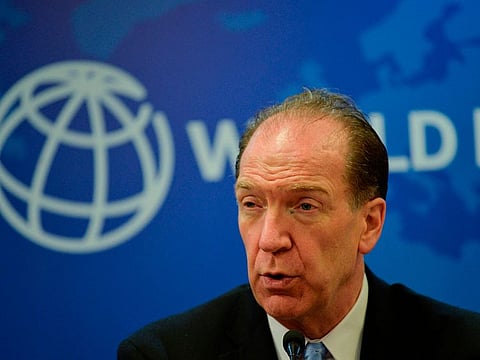World Bank, IMF chiefs to meet, global economic challenges on the agenda
Recent string of bank failures has increased the risk of a recession, said Malpass

Dubai: World Bank Group President David Malpass and International Monetary Fund (IMF) Managing Director Kristalina Georgieva will kick off the 2023 Spring Meetings by discussing the global economy’s complex challenges. Set to take place in Washington DC from April 10 to 16 under the theme ‘The way forward: Building resilience and reshaping development’, the two intra-governmental organisations will discuss the impact of stubborn inflation, cost-of-living crisis and slower growth.
This conversation will explore how to finance global public goods better and address these challenges together, reported state news agency WAM.
According to the World Bank, three years since the pandemic started, uncertainties and risks still weigh heavily on the global economy.
New economic growth model
Malpass said that countries must stop looking to achieve pre-COVID-19 development economics. Instead, they must look at this moment as an inflexion point into some new (economic) growth model.
“We don’t want it to be a lost decade for growth,” Malpass said. He added that preventing one will require sorting out a global debt restructuring and increasing the resources available to the World Bank, speaking at a US Atlantic Council event.
Malpass said that the recent string of bank failures starting with Silicon Valley Bank has increased the risk of a recession. As small and regional banks are under increasing stress, he added that the financial system needed to maintain access to small loans and local community services these banks provide.
With members of the OPEC+ announcing a voluntary cut to oil production, Malpass said the costs of agricultural inputs and healthy food would rise as well, and will impact food and health systems.
Decline in growth for advanced economies
Meanwhile, Georgieva warned that about 90 per cent of advanced economies are projected to see a decline in their growth rate this year as higher interest rates affect expansion.
After a strong recovery in 2021 came the severe shock of Russia’s war against Ukraine and its wide-ranging consequences, global growth in 2022 dropped by almost half, from 6.1 to 3.4 per cent.
“The slowdown has continued this year. Despite surprisingly resilient labour markets and consumer spending in most advanced economies, and the uplift from China’s reopening, we expect the world economy to grow less than 3 per cent in 2023,” she said at an event in Washington ahead of the Spring Meetings.
There are also stark differences between country groups. Some momentum comes from emerging economies — Asia especially is a bright spot. The IMF chief explains that India and China are expected to account for half of the global growth in 2023.
However, others face a steeper climb. Economic activity is slowing in the US and the Euro area, where higher interest rates weigh on demand.
“For low-income countries, higher borrowing costs come at a time of weakening export demand. And we see their per-capita income growth staying below that of emerging economies. That is a severe blow, making it even harder for low-income nations to catch up,” Georgieva added.
The 2023 Spring Meetings will bring together government officials from the IMF and WBG’s member states, observers and representatives of international, regional and economic organisations, and central bank governors and civil society organisations.
Sign up for the Daily Briefing
Get the latest news and updates straight to your inbox

_resources1_16a08544ee2_large.jpg?w=320&auto=format%2Ccompress&fit=max)

